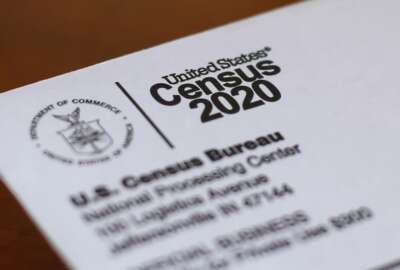
VA still has a slew of appointments to make up
In today's Federal Newscast, two million appointments canceled during the initial wave of the coronavirus pandemic still need rescheduling at the Veterans Health...
To listen to the Federal Newscast on your phone or mobile device, subscribe in PodcastOne or Apple Podcasts. The best listening experience on desktop can be found using Chrome, Firefox or Safari.
- Two million appointments canceled during the initial wave of the coronavirus pandemic still need rescheduling at the Veterans Health Administration. VHA canceled over seven million appointments between mid-March and May 1. The goal was to limit exposure for patients and VA staff to COVID-19 during the height of the pandemic. But VA’s inspector general says it’s important for the agency to follow-up with those patients now. The department risks losing those veterans in an already complex VA health system. Five million of the seven million canceled appointments are rescheduled or converted to virtual consultations.
- Lawmakers in the national capital region are concerned about the Agriculture Department’s reopening policies for employees. Congresswoman Jennifer Wexton (D-Va.) says she’s heard from employees at USDA’s Food and Nutrition Service. They’re worried about being forced to come back to the office without proper safety precautions in place. Wexton, House Majority Leader Steny Hoyer (D-Md.) and their colleagues in D.C., Maryland and Virginia wrote to USDA Secretary Sonny Perdue. They’re asking USDA to revisit and revise its reopening plans.
- Federal employees may not have the option to opt out of the president’s planned payroll tax deferral. The Defense Contract Management Agency told some of its workers, no agency, provider or employee can opt out of the president’s policy. DCMA says all federal providers must implement the payroll tax deferral in unison. But many federal employees are still looking for more answers about the policy and its impacts on their taxes next year. Unions and members of Congress are demanding more information about the payroll tax deferral for federal employees. (Federal News Network)
- The Postal Service has terminated its mail sortation pilot, aimed at getting letter carriers started on their routes earlier in the day. This comes as part of a settlement with the National Association of Letters Carriers, which filed a grievance about the pilot. The Postal Service has agreed to negotiate with the union if it decides to bring back a modified or alternative version of the pilot. The agency started the Expedited to Street/Afternoon Sortation pilot in July, as part of a broader effort to get letter carriers to start and end their routes on time.
- The Census Bureau is working on a compressed timeline to wrap up the 2020 count. Senior Census officials told the House Oversight and Reform Committee in closed-door briefings last week that the bureau has revised its schedule to meet statutory deadlines. But documents prior to the meeting warn of serious risks to data quality if the bureau fast-tracks some quality assurance steps. Bureau officials have also raised concerns about hurricane season causing further delays out of their control. (Federal News Network)
- A trifecta of cybersecurity policy drops yesterday. The Office of Management and Budget and the Department of Homeland Security’s Cybersecurity and Infrastructure Security Agency will keep chief information security officers busy for the next year. OMB released the final vulnerability disclosure policy detailing the overarching approach agencies should take to address new and long-standing holes in their cyber defenses. At the same time, CISA published the VDP binding operational directive and implementation guidance giving CISOs a series of deadlines and questions to consider as they are setting up their VDP and bug bounty programs. The first deadline is March 21 to set up a VDP program. (Federal News Network)
- The Cybersecurity Maturity Model Certification Accreditation Body is partnering with Dunn and Bradstreet to check on companies that want to be third-party assessment organizations and provide assessment services. The accreditation body and D&B signed an memorandum of understanding where the company will provide financial and ownership background checks on a pro bono basis. The CMMC-AB began training the first cohort of 3PAOs and assessors this week.
- A federal appeals court rejected one of the legal challenges to DoD’s JEDI Cloud program. On point after point, the Court of Appeals for the Federal Circuit agreed with a lower court ruling that had already sided against Oracle. The unanimous three-judge panel rejected each of Oracle’s arguments. The company had challenged DoD’s decision to make JEDI a single-award contract, it’s cybersecurity criteria, and also alleged conflicts of interest. The multibillion dollar contract still faces a separate legal challenge by Amazon Web Services. The Pentagon plans to take corrective action that could resolve that case by September 16. (Federal News Network)
- The Defense Health Agency launched 74 new websites for Air Force hospitals and clinics. The websites use the TRICARE domain to incorporate easier access to information about the facilities and insurance. The website upgrades are part of the DHA’s takeover of military medical facilities. The Air Force has already transitioned all of its hospitals and clinics to DHA. The agency will own all of the military’s medical infrastructure by 2022, however, DHA is experiencing some pushback from the military services.
- The third annual innovation rodeo is starting this month. The campaign, hosted by Air Force Installation and Mission Support Center, gives service members and civilians a chance to win a million dollars in funding and resources to pursue their ideas. The theme this year is Base of the Future, the Air Force is looking for ideas on how installations can change to move the service forward. The campaign is open until December first.
- The Securities and Exchange Commission delayed, for the second time, a vote on a rule the whistleblower community doesn’t like. The rule under consideration has been baking for two years. It would let the SEC trim the larger monetary awards whistleblower can receive for exposing corporate malfeasance. Awards run from 10% to 30% of the dollar sanctions the SEC levies so the money doesn’t come from federal appropriations. In July, the SEC said it had awarded $119 million to 20 people in the prior 10 months alone.
Copyright © 2025 Federal News Network. All rights reserved. This website is not intended for users located within the European Economic Area.
Eric White
Eric White is news anchor and Federal Drive producer at Federal News Network.
Follow @FEDERALNEWSCAST
Related Stories

Census officials wary of ‘serious’ risks to data quality with compressed timeline
Related Topics
Agriculture Department
Air Force Installation and Mission Support Center
All News
Census Bureau
Covid-19
Cybersecurity and Infrastructure Security Agency
Cybersecurity Maturity Model Certification
Defense Contract Management Agency
Defense Health Agency
Department of Homeland Security
Federal Drive
Federal Newscast
JEDI
Jennifer Wexton
Michael Missal
National & World Headlines
Office of Management and Budget
Postal Service
Securities and Exchange Commission
Sonny Perdue
Steny Hoyer
Tom Temin
Veterans Affairs
Veterans Health Administration
whistleblower



